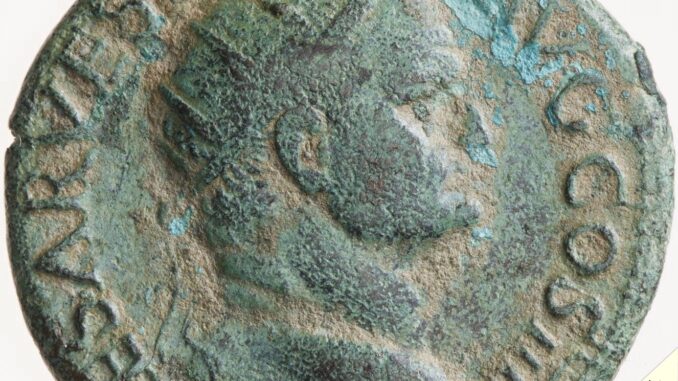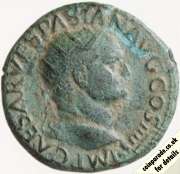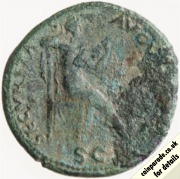
 The 72AD-73AD Dupondius - Vespasian / Securitas
The 72AD-73AD Dupondius - Vespasian / SecuritasOrichalcum Dupondius of Emperor Vespasian struck around 72-73AD at the Lugdunum Mint in Gaul. Orichalcum is a golden-coloured bronze alloy that was often used in ancient Rome coinage. Diameter 29mm and weighs 10.8g.
The date is derived as the coin says COS IIII and Vespasian was Consul for fourth time in 72 AD and his fifth from 1 January 73. The coin from Lugdunum does not appear to mention the Censorship, which he took up on 1 July 73, until the issues of 74 AD.
The Obverse shows the head of Emperor Vespasian with small globe at end of neck truncation (indicates the Lugdunum Mint). Legend is "IMP CAESAR VESPASIAN AVG COS IIII".
 The Reverse shows Securitas (the goddess of security and stability, especially the security of the Roman Empire) seated on a chair facing right holding a long sceptre in her left hand. (The area on the right would have shown an alter but this coin is corroded).
The Reverse shows Securitas (the goddess of security and stability, especially the security of the Roman Empire) seated on a chair facing right holding a long sceptre in her left hand. (The area on the right would have shown an alter but this coin is corroded). Legend "SECVRITA S AVG[VSTI]". "SC" in exergue; SC means senatus consultum, or 'by decree of the Senate' so the coin was an official issue.
Image credit: Museums Victoria
Mintage: Not known
Minted at Roman Mint
More information (monarch, year, mint, country, category) can be found below coin listings.
Below are some coins currently being offered on eBay. As an eBay Partner, We may be compensated if you make a purchase.
List items on:
List items on:
Vespasian (Emperor 69AD-79AD)
Vespasian became Emperor in 69AD; in the Year of the Four Emperors, Vespasian was the fourth and last, and reigned for 10 years. His official reign was 1 July 69AD to 23 June 79AD, but actually he was only declared emperor by the Senate while he was in Egypt on 21 December 69.Titus Flavius Vespasianus was born on 17 November 9AD in Falacrine and worked his way up, becoming a legate (equivalent to a modern day General) in the Augustus army that invaded Britain. He became Emperor when he was around 60 years old and ruled until his death on 23 June 79AD, aged 69. He was succeeded by his son Titus, so becoming the first Roman emperor to be succeeded by his natural son and establishing the Flavian dynasty.
Official name: TITVS FLAVIVS CAESAR VESPASIANVS AVGVSTVS.
Category: Roman
The Roman Empire was one of the largest Empires in history, covering most of Europe, Britain, parts of Asia, the Middle East and North Africa. It was in existence from 27BC to 476AD, more than 500 years. And all these places used Roman coins throughout the era.Originally coins were minted only in Rome, but by the third Century there were mints in other countries too. These mints sometimes produced more than 2 million coins per month to meet demand. Coins typically depicted the Emperor on one side and some other image or letters on the other. During the Empire, more than 10,000 different types of coins were created using copper, silver and gold.
Roman coins are usually classified as:
- Roman Republican Coins (about 300BC - 27BC)
- Roman Imperial Coins (27BC - 96AD)
- Roman Imperial Coins (96AD - 235AD)
- Roman Imperial Coins (235AD - 476AD)
- Roman Provincial Coins
The Denarius was the standard Roman silver coin and there were a range of others. As a guide, in the early republic (after 211BC) there was the Sestertius (=4 denarii), Dupondius (=5), As (=10, a tenner), Semis (=20), Quincunx (=24), Triens (=30), Quadrans (=40), Uncia (=120) and Solidus (=1000, it was gold). Values fluctuated later due to debasement and inflation.
The exchange values were as follows:
1 gold aureus = 25 silver denarii
1 silver denarius = 16 copper asses
1 brass sestertius = 4 copper asses
1 brass dupondius = 2 copper assses
1 copper as = 2 copper semisses (or 4 copper quadrantes)
The standard gold coin was the Aureus and was equal to 25 denarii or 100 sestertii. It's not far off the weight of a modern gold sovereign. The Aureus was introduced by Julius Caesar around 49BC and was the principal gold coin until about the 4th century when it was replaced by the gold Solidus.
The great part of this is that you can put together a really nice Roman coin collection with very little money, as many coins (although not all) are common and inexpensive. The coins are the best part of 2000 years old and are exciting to collect.
For more information see our articles:
Which Mint: Roman Mint
The origins of the Rome mint are from the manufacture of a silver coin near to the Temple of Juno Moneta back in 269BC. Juno was the personification of money.Due to the size of the Roman Empire, Rome could not produce all the coins needed and Roman mints were set up in 27 locations, and there were more than 600 provincial mints scattered about the Empire. During overseas campaigns, Generals such as Caesar and Marc Anthony would mint their own coins to pay their armies.
Mint marks were used on the coins to differentiate the mint of manufacture.
Country of Origin: Roman Empire
The Roman Empire ran from 27BC to 476AD and was the post-Republican period of ancient Rome. It covered a large territory of Europe, Northern Africa, and Western Asia. It was ruled by an Emperor.







